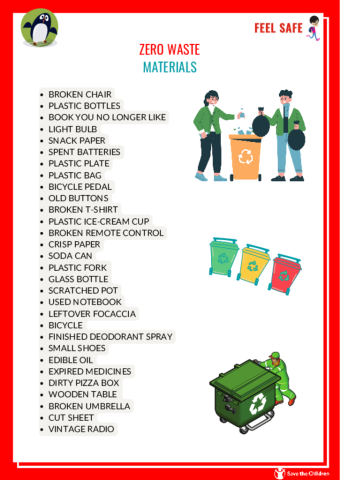Zero Waste
Before starting
The “zero waste” concept is a topic of increasing relevance in the contemporary debate on environmental sustainability Development that ensures that the needs of the present generation are met without compromising the ability of future generations to meet their own needs .
To begin a discussion on this topic, the teacher proposes a brief debate, inviting the students to share their ideas and interpretations regarding the meaning of “zero waste”.
Once the various inputs have been gathered, the teacher provides the class with a more detailed definition of the concept:
“Zero waste strategy” is defined as a set of practices and principles aimed at minimizing the amount of waste generated. This goal can be achieved not only through proper sorting of materials and their reuse, but also by avoiding the use of single-use items and reducing the accumulation of unnecessary waste.
A zero-waste city
To promote a “ZERO WASTE” city, four key words are essential:
- Reduction: It is essential to develop a culture of responsible consumption, buying only what we really need and trying to limit waste.
- Reuse: Encouraging the reuse of objects and materials not only prolongs their life, but also contributes to a decrease in the frequency of purchases, thus reducing the overall environmental impact.
- Recycling: Where neither reduction nor reuse is possible, proper sorting is crucial. This implies strict separation of materials, depositing them in the appropriate containers or delivering them to the designated collection centers.
- Composting: The practice of composting food waste is an important strategy for alleviating the load on landfills. It allows organic waste to be transformed into valuable soil nutrients, thereby supporting more sustainable agricultural practices.
The teacher asks the class if their town or city can be considered zero waste, inviting them to look up this information online.
The winning strategy
The teacher introduces the game activity by dividing the class into groups.
Starting with the previous information, each group is given a list of materials (see attached “Zero Waste - Materials” below) to reflect on and discuss, deciding which strategy to apply to improve the city's efficiency, determining, for example, whether it is more appropriate to put materials in the appropriate collection bins or to look for reuse opportunities.
Once the strategy is established, each group should be able to justify their choices, thus encouraging critical thinking about the environmental impact of the decisions made.
To make the experience even more realistic, each group can be provided with a map of their city or municipality of residence. On the map, groups will be able to identify and properly place collection points for different materials (such as plastic, glass, paper, mixed waste, organic waste, spent batteries, used oil, and expired medications). If there is a municipality that offers door-to-door collection service, groups will also be able to indicate the specific days on which waste delivery takes place.
Concluding thoughts
After sharing the groups' strategies and bringing the class back to plenary, the teacher collects the main themes that emerged and the most popular strategies.
The teacher explains that the concept of “Zero Waste” represents much more than just a strategy that can be adopted to drastically reduce the amount of waste delivered. For it to truly make a significant impact on the environment, it is essential that it become a way of life in its own right. In this context, it makes sense to move toward alternatives already available on the market that are defined as “eco-friendly,” thus promoting greater sustainability Development that ensures that the needs of the present generation are met without compromising the ability of future generations to meet their own needs in our daily choices.
The teacher can conclude the activity by asking the following stimulus questions:
- How close to 'zero' are you?
- What eco-friendly consideration or attention do you and your family have at home to minimize waste?

Add new comment